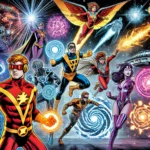A great movie can stay with us long after the credits roll, but some films do more than just leave an impression—they spark heated debate. Whether it’s an unexpected twist or a deliberately ambiguous conclusion, certain movie endings have divided fans and critics alike. Here are ten of the most controversial movie endings that still have people talking.
Inception (2010)
Director: Christopher Nolan
Few movie endings have sparked as much conversation as Christopher Nolan’s Inception. The film follows a team of dream thieves led by Dom Cobb (Leonardo DiCaprio) as they navigate through layers of reality and dreams. The ending leaves viewers wondering if Cobb is still stuck in a dream or has finally returned to the real world. The spinning top, used to differentiate reality from dreams, keeps spinning as the screen cuts to black, leaving fans questioning the film’s true conclusion.
Why it’s controversial:
- Ambiguity leaves the audience to decide for themselves.
- Fans have developed numerous theories, but the director never confirmed any of them.
The Sopranos (2007)
Director: David Chase
Although technically a TV series, the ending of The Sopranos was so divisive that it deserves a spot here. In the final scene, Tony Soprano and his family sit in a diner when the screen suddenly cuts to black without warning. The unresolved nature of the scene left viewers frustrated and sparked endless debates over whether Tony was killed.
Why it’s controversial:
- The abrupt cut to black provided no closure, leaving fans to speculate endlessly.
- Some felt it was a fitting conclusion to a series about uncertainty and danger, while others saw it as incomplete.
Fight Club (1999)
Director: David Fincher
David Fincher’s Fight Club is notorious for its mind-bending narrative, but it’s the film’s anarchic ending that polarized fans. After realizing that Tyler Durden is a figment of his imagination, the protagonist watches buildings explode in the distance. The juxtaposition of chaos with the soft soundtrack (“Where Is My Mind” by Pixies) has left some viewers in awe, while others found it unsatisfying.
Why it’s controversial:
- Some fans saw it as a brilliant critique of consumerism, while others were unsettled by its nihilism.
- The final act leaves viewers questioning the protagonist’s future, with no clear resolution.
The Matrix Revolutions (2003)
Directors: The Wachowskis
The Matrix trilogy captivated audiences with its groundbreaking visual effects and philosophical themes. However, the ending of The Matrix Revolutions left many fans feeling confused. Neo sacrifices himself to broker peace between humans and machines, but the nature of the “truce” remains unclear, leading to mixed reactions.
Why it’s controversial:
- Many felt it was too ambiguous and didn’t provide a satisfying conclusion to the series.
- Others appreciated the ending’s boldness in keeping its world’s rules enigmatic.
No Country for Old Men (2007)
Directors: Joel and Ethan Coen
In No Country for Old Men, the villain Anton Chigurh’s fate remains uncertain, while the protagonist, Sheriff Bell, quietly retires, reflecting on a dream he had. The lack of a dramatic climax and unresolved plot points left audiences scratching their heads.
Why it’s controversial:
- The film subverts traditional thriller conventions, offering no catharsis.
- Some fans appreciated the philosophical conclusion, while others felt it left too many questions unanswered.
The Mist (2007)
Director: Frank Darabont
Few endings are as bleak as the one in The Mist. After a group of survivors escape into a world overrun by mysterious creatures, David (Thomas Jane) makes the horrifying decision to mercy-kill his fellow survivors, including his son, only to be rescued moments later. The gut-wrenching twist was met with both acclaim and outrage.
Why it’s controversial:
- Some praised the film’s bold, shocking conclusion, while others were deeply disturbed.
- The ending was a significant departure from Stephen King’s novella, surprising fans of the original story.
La La Land (2016)
Director: Damien Chazelle
La La Land captivated audiences with its romantic portrayal of two artists chasing their dreams. However, the ending, which flashes forward to show an alternate version of events, divided fans. Mia and Sebastian don’t end up together, but the dream-like sequence showing what could have been left some viewers longing for a happier conclusion.
Why it’s controversial:
- Some fans appreciated the realistic, bittersweet take on love and ambition.
- Others found it disappointing that the film didn’t end with the characters together.
The Prestige (2006)
Director: Christopher Nolan
Another Christopher Nolan entry, The Prestige is a film about two magicians locked in a bitter rivalry. The twist ending reveals that one of the magicians, Alfred Borden, has been using a twin brother to pull off his illusions, while the other, Robert Angier, has been cloning himself. The morally ambiguous ending left fans debating the ethics of both magicians’ actions.
Why it’s controversial:
- Some fans loved the mind-bending nature of the twist, while others found it overly complex.
- The film’s dark conclusion left viewers questioning who the real villain was.
Shutter Island (2010)
Director: Martin Scorsese
In Shutter Island, U.S. Marshal Teddy Daniels (Leonardo DiCaprio) investigates a mysterious disappearance, only to realize that he is actually a patient at the mental institution. The film’s final moments suggest that Daniels may be willingly choosing to forget the truth, but the ambiguity has sparked numerous fan theories.
Why it’s controversial:
- The ambiguous nature of Daniels’ fate left many fans unsettled.
- Some loved the psychological depth, while others found it frustratingly inconclusive.
2001: A Space Odyssey (1968)
Director: Stanley Kubrick
Stanley Kubrick’s science-fiction epic is celebrated as one of the most influential films of all time, but its abstract, surreal ending has puzzled audiences for decades. After traveling through the Stargate, astronaut Dave Bowman experiences a series of cryptic visions before being transformed into the Star Child. The meaning behind the ending remains a point of debate.
Why it’s controversial:
- Kubrick’s refusal to provide clear answers left viewers to interpret the ending for themselves.
- Some hailed it as a masterpiece of visual storytelling, while others were baffled by its lack of closure.
Conclusion
Movie endings can make or break a film, but the ones that spark the most debate often stay with us the longest. Whether they leave us scratching our heads, filled with awe, or frustrated beyond belief, these ten endings have undoubtedly made their mark on cinematic history. What do you think—did these films get it right, or do they deserve the controversy?


